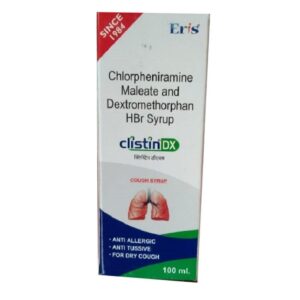CHLORPHENIRAMINE + DEXTROMETHORPHAN + AMMONIUM CHLORIDE
Chlorpheniramine: Chlorpheniramine is an antihistamine drug that is commonly used to treat allergies and common cold symptoms. It works by blocking the effects of histamine, a substance in the body that causes allergic symptoms such as runny nose, sneezing, itching, and watery eyes.
This medication can be taken orally, in the form of tablets or liquid suspension. The usual adult dose of chlorpheniramine is 4 mg to 8 mg every 4 to 6 hours as needed, with a maximum daily dose of 32 mg. For children, the dose is based on their weight and age, and should be determined by a healthcare professional.
Side effects of chlorpheniramine might include drowsiness, dizziness, dry mouth, blurred vision, constipation, or stomach upset. These effects are usually mild and temporary, but caution should be exercised while driving or performing activities that require alertness until the individual knows how they react to the medication.
Chlorpheniramine may also cause dizziness or confusion in older adults, and it should be used with caution in this population. Additionally, individuals with certain medical conditions, such as asthma, glaucoma, prostate problems, or urinary obstruction, should consult with their healthcare provider before taking this medication.
It is important to note that chlorpheniramine can interact with other medications, such as sedatives, tranquilizers, other antihistamines, and opioid pain medications, leading to increased drowsiness. It is advisable to inform the healthcare provider of any other medications being taken to avoid potential interactions.
In summary, chlorpheniramine is an antihistamine drug used for the treatment of allergies and common cold symptoms. It works by blocking the effects of histamine in the body. The dose and frequency of administration depend on the individual’s age and condition. Although generally safe, chlorpheniramine can cause drowsiness and other mild side effects. Proper caution should be exercised while taking this medication, especially in older adults and when using it in combination with other medications.
Dextromethorphan: Dextromethorphan (DXM) is a medication commonly used as a cough suppressant. It belongs to a class of drugs known as antitussives. DXM works by inhibiting the cough reflex in the central nervous system, providing temporary relief from coughing. It does not treat the underlying cause of the cough but rather alleviates the symptom.
The drug is available in various forms, including syrups, capsules, lozenges, and tablets. It is often found in combination with other medications, such as expectorants or decongestants, to provide relief from multiple cold and flu symptoms.
The recommended dose of dextromethorphan varies depending on the formulation and the age of the patient. In general, for adults and children over 12 years old, the typical dose is 10-20 mg every 4-6 hours as needed. For children aged 6-12 years, the dose is usually 5-10 mg every 4-6 hours as needed. It is essential to follow the instructions on the packaging or as directed by a healthcare professional.
Although dextromethorphan is generally safe when used as directed, it can cause certain side effects. Common side effects may include dizziness, drowsiness, nausea, vomiting, and stomach discomfort. Some individuals may also experience allergic reactions, such as rash, itching, swelling, or difficulty breathing. It is important to seek medical attention immediately if any severe side effects occur.
Additionally, it is worth noting that DXM has the potential for abuse and misuse as it can produce euphoric and hallucinogenic effects in high doses. Overdose of dextromethorphan may lead to symptoms such as confusion, blurred vision, rapid heartbeat, hallucinations, and even seizures. The misuse or abuse of DXM can be dangerous and can have serious consequences. Therefore, it is important to use the medication responsibly and according to the recommended dose.
Ammonium Chloride: Ammonium Chloride is a medication that is commonly used as an expectorant to help loosen and cough up mucus in the airways. It is also used to maintain the pH balance in the urine and as an acidifying agent in certain medical conditions.
The mechanism of action of Ammonium Chloride as an expectorant is not fully understood. It is believed to work by increasing the production and secretion of respiratory tract fluids, which helps to thin and loosen mucus.
Ammonium Chloride is available in various forms, including tablets, syrup, and inhalation solution. The dose of Ammonium Chloride may vary depending on the specific formulation and the condition being treated. It is important to follow the instructions provided by the healthcare professional or the dosage instructions on the product label.
Common side effects of Ammonium Chloride may include nausea, vomiting, stomach discomfort, and headache. It may also cause an unpleasant taste in the mouth. These side effects are usually mild and temporary. However, if any severe or persistent side effects occur, it is important to seek medical attention.
It is essential to inform the healthcare professional about any pre-existing medical conditions or ongoing medications before using Ammonium Chloride. Certain individuals, such as those with kidney problems or peptic ulcers, may need cautious use or a dose adjustment.
In summary, Ammonium Chloride is a medication used as an expectorant to help release mucus in the airways. It works by increasing respiratory tract fluid production. The dose and formulation may vary, and side effects include nausea, vomiting, and stomach discomfort. It is crucial to consult a healthcare professional or refer to the product label for accurate dosing instructions.

